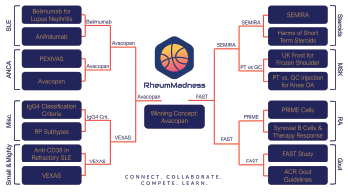
Tasha Art; PureSolution / shutterstock.com
RheumMadness is an online collaborative learning experience created to educate trainees, rheumatologists and the wider medical community about recent advances and important concepts in rheumatology. The project is funded by the Rheumatology Research Foundation Clinician Scholar Educator (CSE) Award and modeled after NephMadness, an educational initiative of the American Journal of Kidney Diseases (AJKD) that has engaged over a thousand nephrologists from all over the world.1-3
After a successful first year of RheumMadness, we are on course to create similar engagement in the rheumatology community, and we are thrilled to share our early experiences with this fun and educational activity.
In RheumMadness, rheumatology concepts are entered as teams to compete in a single-elimination tournament, much like basketball teams in the U.S. National Collegiate Athletic Association (NCAA) compete in the March Madness tournament. The 16 teams in the 2021 RheumMadness bracket are recently published studies, such as avacopan for anti-neutrophil cytoplasmic antibody (ANCA) associated vasculitis and pre-inflammatory mesenchymal (PRIME) cells in rheumatoid arthritis (see Figure 1). Participants submit their own bracket, in which they try to predict the winners of each match-up. The winners are then chosen by a Blue Ribbon Panel of rheumatology content experts.
Throughout this process, participants are invited to engage with a variety of social and educational elements designed to enable everyone who is crazy about rheumatology to connect, collaborate, compete and learn together.
Connect

Figure 1: The 2021 RheumMadness Bracket
RheumMadness is grounded in social constructivist learning theory, which proposes that deep and meaningful learning occurs when people build knowledge together through discussion, debate, shared experiences and other forms of social interaction.4 We all intuitively understand the value of social constructivism; it is the reason we have book clubs, interest groups and case-based discussions. Yet often, when we need to learn something new in medicine, we attend non-interactive lectures or scroll abstracts on PubMed alone. Even interactive journal clubs at our own practices are limited by traditions and local pockets of expertise (or lack thereof), and we could all benefit from an increased diversity of perspectives on rheumatology topics.
With this in mind, RheumMadness is designed to build a community of learners online. Twitter is a lively forum for RheumMadness participants, with a total of 486 tweets from 105 users using the hashtag #RheumMadness during the 2021 tournament (see Figure 2). The impact of these tweets can be estimated by measuring



